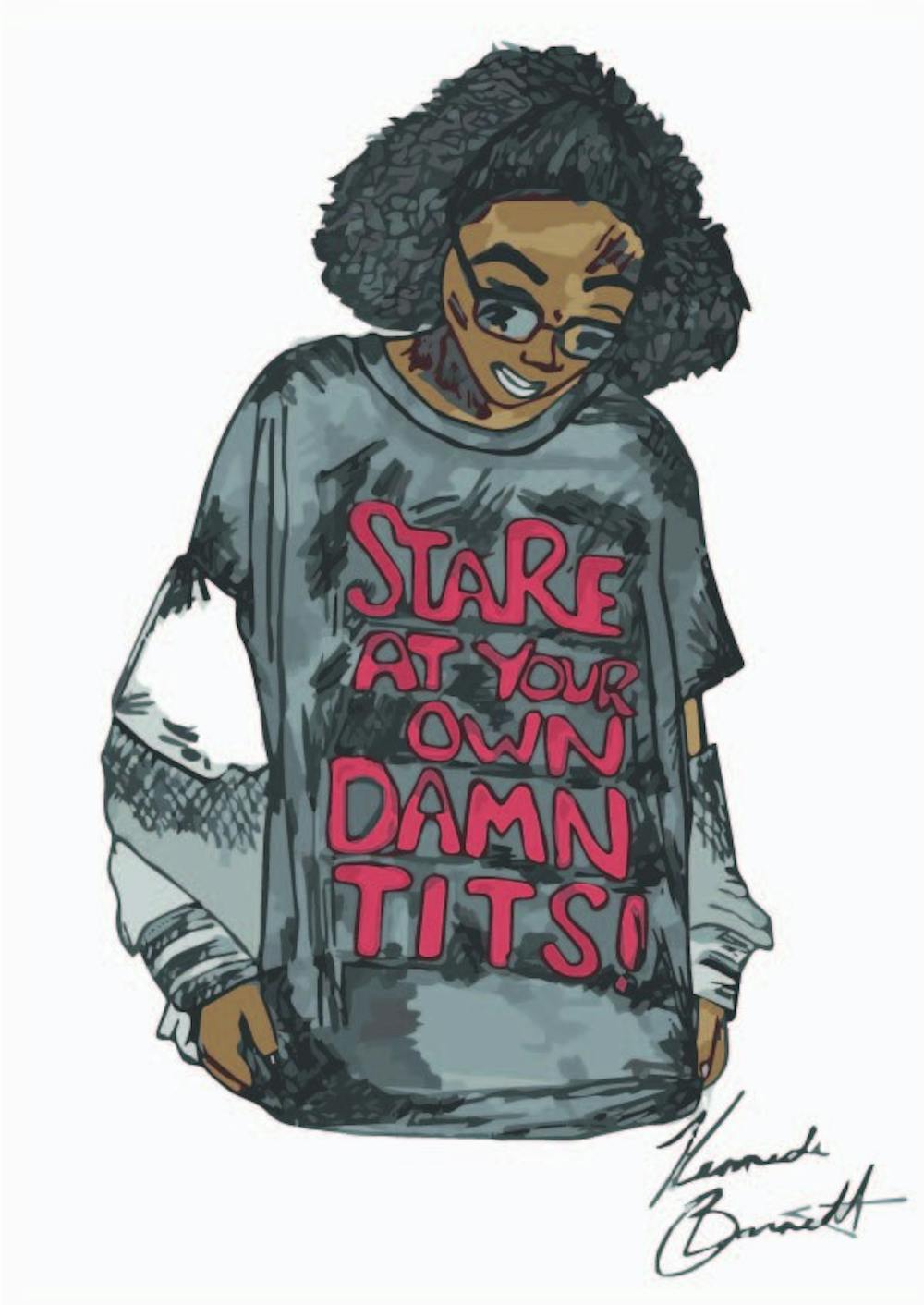
Drew Locklear is a junior journalism major and writes “Endlessly Thinking” for The Daily News. Her views do not necessarily agree with those of the newspaper.
Every morning, I chuck numerous tops onto my bed because they just aren’t quite what I want to wear that day. I rummage through my overflowing closet until I finally find the top — the one that makes me feel unstoppable and the only one that matches my mood for the day.
I walk out of my room, feeling satisfied knowing that I’m wearing my ideal outfit for the day and that I won’t be overthinking it.
All of that comes to a halt when I feel it.
I think I can confidently say the majority of people have felt it — the feeling of those eyes gazing over us as though they could never be caught, as though we aren’t ourselves. That what we wear defines us and that if I’m wearing a tight dress, that means I want someone to ask me for my number — that I’m asking for that attention.
“That’s what you’re wearing?” is something I, and I’m sure others, no matter their gender, have heard from their parents, a friend, a spouse, a stranger or really anyone who just wants to tell us their opinion — an opinion we didn’t ask for.
The worst is when you actually question your look. There have been situations where I’ve asked myself why I even chose a certain outfit. “I saw that man’s look, and I know that is what I’ll be getting all day. If I can’t handle these looks, then maybe I shouldn’t be wearing this in the first place,” I think sometimes. I’ll keep thinking this until sometimes it becomes too much, and I go home and change.
But why should I have to change because others can’t simply avert their eyes and accept that I am comfortable and happy without their remarks? Why do they get to assume who I am based on my clothes?
I like to think that no matter what others think, I’ll wear what I want. Sometimes, the judgement, verbal or silent, is too much to handle. This needs to change. Just because I wear a low-cut top or no bra does not mean I am less worthy of respect or that I want to be harrassed.
Something I’ve always heard growing up is that girls need to cover up as to not distract the boys. Between the U.S. and Canada, roughly 100 news stories about breaking dress codes have been written between 2013-18, according to a 2019 study by Meredith Neville-Shepard. While I don’t personally remember anyone being sent home for their attire, when I was in middle school, if a girl was wearing an outfit that showed her shoulders, she would be given a sweatshirt to cover up. Many young women and girls have talked about similar situations, such as being sent home from school or told to cover up for bra straps showing, for not wearing a bra, wearing tops that reveal collarbones or shoulders and even a principal telling their students that they must be a size 0 to 2 in order to wear leggings because otherwise, they will look “fat.”
This is a way to body shame female students through the “rules” of the education system. These dress codes, whether official or not, and judgements on what people wear start at an early age, and it doesn’t get better as we get older.
I’ve been shamed for my choice of clothing and sexualized over outfits that were in no way revealing. A couple weeks ago, I was walking through Walmart by myself, wearing an oversized denim jacket over a T-shirt with no bra, leggings and boots. My jacket covered my breasts, and I felt comfortable in what I wore. On my way out of the store after checking out, a man, probably in his late 30s, looked me up and down, and I stopped to stare back, in shock of how blatantly he was doing this.
He then said the word “sexy” to me, and I said, “What the f***?” out loud. How could he think that was OK? He sexualized me out loud and in public — not that any situation is OK for someone to do this. I was just in shock of how bold he was about it — and instead of responding to me, he didn’t even acknowledge me. He just kept walking as though nothing had happened, leaving me in shock.
This past summer, I visited some family in North Carolina. It was a hot day, about 90 degrees, and I wore a tube top without a bra and jeans out. My dad asked if I was sure I wanted to wear that outfit out, and I said yes. I received a lot of looks as we went through the store that made me insecure to say the least — it seemed to be obvious to the other shoppers that I wasn’t wearing a bra. After we left, I went home to change, and my dad told me he didn’t care what I wore. He was worried about protecting me from how I was feeling.
The comments the people close to us share about our clothing are usually out of concern for our safety — like my dad’s comments. In my experience, they don’t care about what we wear. They’re simply worried about others and their reactions. They know some people won’t hold themselves back and won’t care about how their actions make us feel.
I preached to my dad that it didn’t matter what anyone had to say about my outfit. I chose it, and that’s all that mattered. However, my confidence didn’t stop me from seeing those eyes and having a slight feeling of shame wash over me. I asked myself if my outfit was too revealing or if I was embarrassing myself by wearing this.
The idea that what we wear determines the attention we want from others and is even perceived as a green light for others to harass us has been normalized. In a survey conducted by The Independent, a British online magazine, it was found that 55 percent of males and 41 percent of females agree the clothing one wears determines their likelihood of experiencing sexual misconduct. This ideology is a huge part of victim blaming — that if they just covered up, maybe they’d not have been harassed or assaulted.
Rape, Abuse & Incest National Network (RAINN) says only 23 pecent of sexual assaults are reported to police. Many of these go unreported due to shame, guilt, humiliation and fear of not being believed or fear that their perpetrator will not be held responsible.
Tolerating victim blaming keeps people quiet and convinces them their assault is their fault for a variety of reasons — one of those reasons being what they were wearing.
It’s a frustrating thing to see the people who are judging me with their eyes or even undressing me with them. It can feel like everyone has an opinion, and none of them feel good. While I’ve been in college, I’ve noticed people with insane confidence and carefree attitudes when it comes to what they wear. It’s liberating to see, and being surrounded by this energy on a consistent basis, along with maturing and growing into myself, I’ve noticed myself developing those same characteristics. My style has become more bold, and as I’ve experimented with it, I’ve come across a refreshingly proud feeling that I’m unfamiliar with and can’t get enough of.
I can finally say that I’ve reached a point that I wear what I want, and aside from taking concerns from my dad, for instance, into consideration, I’m not concerned about what anyone has to say about my clothes.
For me, it’s a matter of remembering my opinion is the only one worth listening to. I chose my outfit because I love it, and I’m wearing it out because it makes me feel good, and I want people to see that and feel my happiness, too.
These systems set in place telling women what they can or cannot wear, as if wearing a skirt that shows more skin than a pair of jeans means women are promiscuous or want attention, are the same ones that perpetuate the idea that women are objects and simply things to be controlled for the sake of men and their sexual desires.
We need to get to the point that what one wears genuinely doesn’t matter, and the first step is showing the world we don’t care what it has to say. Own what you wear because it’s your body, your clothes and your choice. I feel amazing now, no matter what I wear, and I hope we all can reach that point because it’s what we deserve. It isn’t your responsibility to help people control themselves — all you should be worried about is picking the top that makes you feel unstoppable.
Contact Drew Locklear with comments at dmlocklear@bsu.edu.





